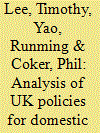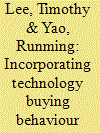| Srl | Item |
| 1 |
ID:
127907


|
|
|
|
|
| Publication |
2014.
|
| Summary/Abstract |
This paper introduces a new agent-based model, which incorporates the actions of individual homeowners in a long-term domestic stock model, and details how it was applied in energy policy analysis. The results indicate that current policies are likely to fall significantly short of the 80% target and suggest that current subsidy levels need re-examining. In the model, current subsidy levels appear to offer too much support to some technologies, which in turn leads to the suppression of other technologies that have a greater energy saving potential. The model can be used by policy makers to develop further scenarios to find alternative, more effective, sets of policy measures. The model is currently limited to the owner-occupied stock in England, although it can be expanded, subject to the availability of data.
|
|
|
|
|
|
|
|
|
|
|
|
|
|
|
|
| 2 |
ID:
117250


|
|
|
|
|
| Publication |
2013.
|
| Summary/Abstract |
The UK has a target for an 80% reduction in CO2 emissions by 2050 from a 1990 base. Domestic energy use accounts for around 30% of total emissions. This paper presents a comprehensive review of existing models and modelling techniques and indicates how they might be improved by considering individual buying behaviour. Macro (top-down) and micro (bottom-up) models have been reviewed and analysed. It is found that bottom-up models can project technology diffusion due to their higher resolution. The weakness of existing bottom-up models at capturing individual green technology buying behaviour has been identified. Consequently, Markov chains, neural networks and agent-based modelling are proposed as possible methods to incorporate buying behaviour within a domestic energy forecast model. Among the three methods, agent-based models are found to be the most promising, although a successful agent approach requires large amounts of input data. A prototype agent-based model has been developed and tested, which demonstrates the feasibility of an agent approach. This model shows that an agent-based approach is promising as a means to predict the effectiveness of various policy measures.
|
|
|
|
|
|
|
|
|
|
|
|
|
|
|
|